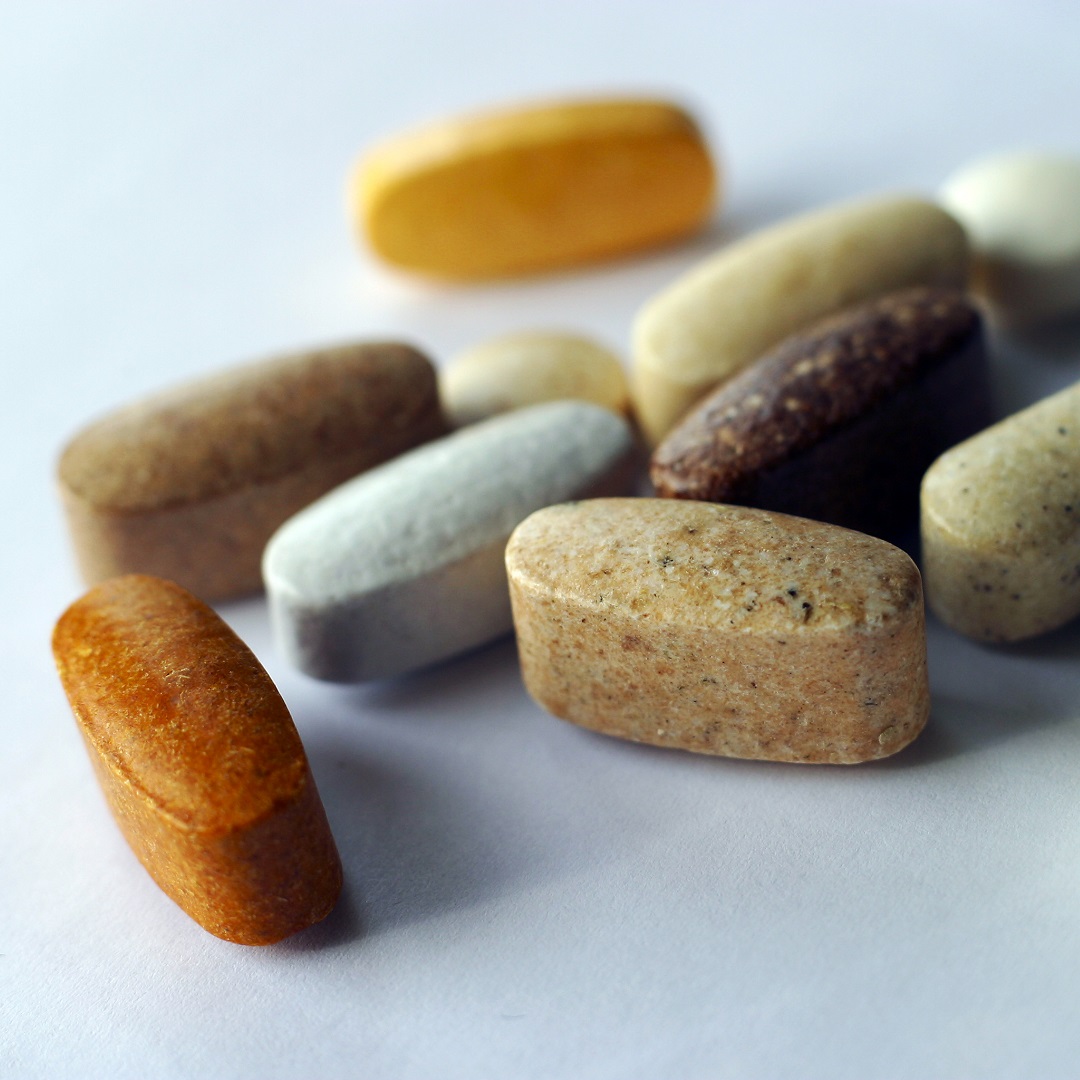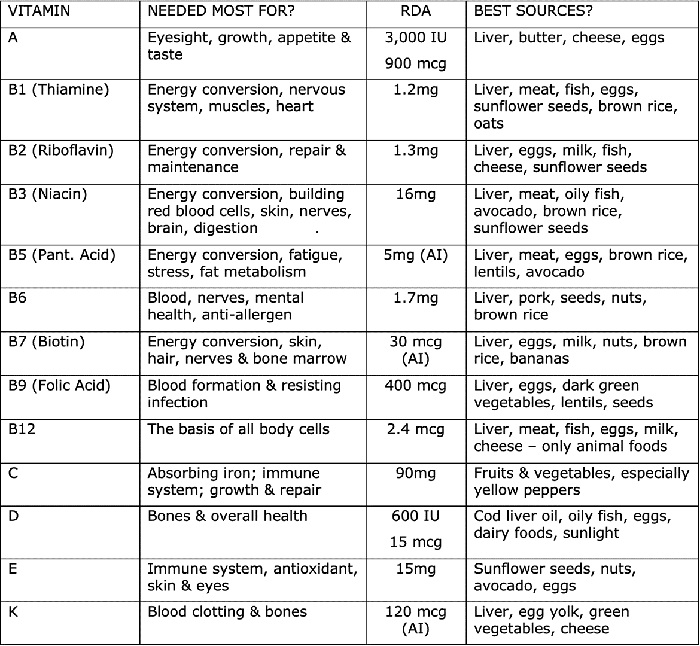by Stephen Luther, M.D.
Share

The Vit-Connection in Vital and Vitamins
Micronutrients: so small yet so great. Your well-being hinges on daily consumption of vitamins, as micro here means small amounts, not minimal importance. Symbios encourages you to enjoy a heaping dose of health by understanding vitamins’ VITAL functions and filling up on these essential organic compounds.
Vitamin Absorption
How the 13 vitamins are absorbed and stored depends on whether they are fat or water-soluble. As the name suggests, fat-soluble vitamins (A, D, E, and K) are consumed, absorbed, and stored with fats. America Doesn’t Even Know can help us remember that vitamins A, D, E, and K require fat because following the government’s low-fat diet recommendations leaves many Americans low in key, fat-soluble vitamins.
The water-soluble vitamins are vitamin C and the vitamin B group, which comprises B1 (thiamine); B2 (riboflavin), B3 (niacin), B5 (pantothenic acid), B6 (pyridoxine); B7 (biotin); B9 (folic acid) and B12 (cobalamin). While the minimum recommended dosage should be consumed daily, Symbios recommends continuously replenishing water-soluble vitamins easily lost through sweat, urine, and feces.
Vitamin Consumption
While general guidelines provide a Recommended Daily Allowance (RDA) or Adequate Intake (AI), it fluctuates for men and women, adults and children, and pregnant and lactating women. Symbios Health can ensure your dosage of supplements meets your specific needs by adding consideration of your age, diet, activity, and health history. Plus, essential vitamins such as B12 and D can be conveniently checked at Symbios Lab.
Summary (Vitamins)

Vitamin A
Fat-soluble vitamin A is essential for vision, promoting immune function, supporting cell growth, and fueling healthy skin and mucous membranes. This antioxidant-rich, infection-fighting vitamin is needed explicitly in our eyes, brain, lungs, kidneys, cells, skin, bones, growth, reproduction, and blood formation.
While two types of vitamin A are found in our diets, our bodies prefer active-preformed vitamin A (retinol), which is bound to a fatty acid and only found in animal products. Provitamin A is less potent because it is from plant-based foods, the most common being beta-carotene. Depending on our gut health, a range of nutrients are lost since our body’s intestinal mucosa and liver must convert the plant sources into vitamin A. It is interesting to note the connection between retinol, the purest form of vitamin A, and the retina in your eye. You may benefit from skin care products that contain retinol.
Foods high in preformed vitamin A are meats, fish, full-fat dairy, and eggs. When seeking provitamin A, look for orange and yellow fruits and vegetables such as carrots, sweet potatoes, spinach, kale, butternut squash, and cantaloupe. We recommend olive oil on those vegetables, as vitamin A needs fat for absorption.
Vitamin A deficiencies lead to vision problems, including night blindness. Lack of vitamin A also impairs immune, growth, and reproduction functions, with an increased risk of infections and rough, dry, scaly skin.
The Vitamin B Group
A combination of eight different B vitamins generally influences our physical and mental health, and they are often referred to as energy and metabolism or mind and mood vitamins. This water-soluble vitamin group needs to be replenished daily. Its most prominent role is metabolizing food and turning it into energy. Healthy hair, skin, and muscle cells count on the Bs for growth and assistance in developing red blood cells. Overall, this staple group affects many functions of our mind, from our mood to cognitive ability to our sense of balance and well-being.
Foods high in various forms of vitamin B include meats, fish, eggs, whole grains, nuts, seeds, legumes, leafy greens, and dairy products.
Deficiency in the vitamin B group can lead to a range of issues, such as fatigue, weakness, neurological problems, and anemia.
Vitamin B1 (thiamine) transforms glucose into energy in muscles and nerves. Extra carbohydrates place additional demands on the amount of vitamin B1 needed.
B1 deficiency symptoms include poor memory, muscle weakness, fatigue, depression, constipation, irritability, lack of concentration, and tingling in feet.
Vitamin B2 (riboflavin) converts fat, protein, and glucose into energy. It is also essential to heal and maintain body tissues and mucous membranes. Our demand for vitamin B2 increases with strenuous exercise.
B2 deficiencies can cause mouth, gastric, and eye ulcerations. Symptoms include bloodshot, gritty, tired, or light-sensitive eyes, sores in the corners of the mouth, trembling, insomnia, and dizziness.
Vitamin B3 (niacin) produces energy from fat, protein, and glucose. It maintains health for your skin, nerves, brain, tongue, and digestive system. Note: Both B2 and B3 are crucial vitamins for the operation of the Krebs cycle, which is the process by which carbohydrates are turned into Adenosine Triphosphate (ATP), the body’s form of energy.
B3 deficiencies can result in pellagra, a disease that causes skin conditions, nausea, vomiting, inflamed digestive tract, and depression. Possible signs indicating a shortage of B3 are dermatitis, diarrhea, and dementia.
Vitamin B5 (pantothenic acid) produces energy and anti-stress hormones. It controls fat metabolism and helps the formation of antibodies. Its role in hormone production makes it helpful in combatting acne.
B5 deficiencies can trigger rheumatoid arthritis or allergic skin reactions. Symptoms pointing to a lack of B5 are stomach pain, fatigue, insomnia, depression, and headaches.
Vitamin B6 (pyridoxine) assists in metabolizing amino acids. It is essential for healthy blood and nerves and energy production. It also serves as an anti-allergen and anti-depressant. Its impact on the nervous system and depression makes it successful in managing premenstrual syndrome.
B6 deficiencies can bring on depression, premenstrual tension, and kidney stones. Symptoms of insufficient B6 are feeling low, breast tenderness, swollen fingers, and ankles, splitting of lips, and scaly facial skin.
Vitamin B7 (biotin) is required for energy production. Plus, it maintains the health of skin, hair, nerves, and bone marrow.
B7 deficiency symptoms range from fatigue, depression, and nausea to a smooth and pale tongue, hair loss, and muscular pains.
Vitamin B9 (folic acid) is pivotal in blood configuration and infection resistance. Folic acid supplements are recommended before and after conception as they are fundamental in fetal development.
B9 deficiencies in women can lead to congenital disabilities, including spina bifida and cleft palate syndrome; it may also cause premature birth, miscarriage, and birth-related complications. Deficiency symptoms in men and women include weakness, fatigue, breathlessness, irritability, forgetfulness, and mental confusion.
Vitamin B12 (cobalamin) is mandatory for cell division, where it is used in rapidly dividing cells in the bone marrow to produce red blood cells. It is also needed to form myelin, a protective sheath around each nerve cell, including the brain and spinal cord. Unlike other B vitamins, B12 is only present in animal foods; therefore, vegans need regular supplements.
B12 deficiencies can contribute to anemia, where symptoms may include pale skin, low energy, dizziness, fainting, and, in severe cases, lethargy, shortness of breath, and palpitations. Other signs of a shortage of B12 include a sore tongue and menstrual disorders.
Vitamin C
Vitamin C (ascorbic acid) should be consumed daily; because it is water-soluble, your body does not store it. This antioxidant (anti = stops, and oxidation = a chemical reaction forming free radicals) helps protect your cells and boost your immune system. Vitamin C repairs all your body’s tissue, bones, and teeth and heals wounds. It also aids collagen synthesis (a protein in skin, ligaments, cartilage, tendons, and blood vessels) and enhances iron absorption from plant-based foods (nonheme sources).
Foods high in vitamin C are citrus fruits, strawberries, kiwis, bell peppers, broccoli, and tomatoes.
Vitamin C deficiencies invoke weakened immunity, frequent infections, delayed wound healing, easy bruising, nosebleeds, dry, scaly skin, and scurvy conditions characterized by fatigue, gum bleeding, and joint pain. The amount of vitamin C in your body is lowered by smoking cigarettes and regular use of nonsteroidal anti-inflammatory drugs.
Vitamin D
Vitamin D, also known as the sunshine vitamin, is vital for strong teeth and bones as it aids in absorbing calcium and phosphorus. It also supports the immune system, possibly assisting in modern illness and disease prevention, including heart disease, cancer, Multiple Sclerosis (MS), and diabetes.
Sources of vitamin D are oily fish such as herring, salmon, halibut, mackerel, or tuna. Exposure to sunlight also helps the body synthesize vitamin D. Natural sources of vitamin D are best, but if more is needed, supplement rather than fortified foods.
Vitamin D deficiencies can foster tooth decay, muscular weakness, and a softening of the bones (rickets), which can cause bone fractures or poor healing of fractures.
Vitamin E
Vitamin E is a fat-soluble, powerful antioxidant that supports the immune system and gives optimal cell protection from oxidative stress (oxygen causing some molecules to become overly reactive and creating imbalance) and damage from free radicals (molecules produced from exposure to tobacco smoke or radiation and when your body breaks down certain foods). Vitamin E is an anti-blood clotting agent and contributes to healthy eyes, blood vessels, and skin.
Sources of vitamin E are almonds, hazelnuts, peanuts, sunflower seeds, avocados, and eggs.
Vitamin E deficiencies may set nerve or muscle damage in motion and manifest as muscle weakness and coordination difficulties. A lack of vitamin E may cause dry skin, damage red blood cells and blood vessels, and inhibit white blood cells from combating infection.
Vitamin K
Vitamin K prevents excessive bleeding, making it foundational for blood clotting and healing wounds. In addition, it promotes good bone and gut health.
Sources of Vitamin K come in two forms. K1 (phylloquinone) is abundant in green vegetables such as kale, spinach, collard greens, broccoli, Brussels sprouts, and green peas. K2 (menaquinone) is found in meats, fermented foods, eggs, and hard cheese. The animal form of this fat-soluble vitamin is the most useful for our bodies.
Vitamin K deficiencies are linked to excessive bleeding (bleeding gums, menstruation, nosebleeds, and bruising) and an increased risk of fractures and osteoporosis.
Symbios Health’s comprehensive care embraces the vital role of nutrient-rich foods that silently orchestrate peak performance in our bodies. Your future well-being, which includes a thriving lifestyle, optimal functioning, robust skin, and abundant energy, begins by consuming and absorbing adequate vitamins.
Your professionals at Symbios Health can detect vitamin deficiencies that can trigger a cascade of health issues; we also offer personalized nutritional guidance that is instrumental in preventing future health setbacks.
While most of America doesn’t even know, Symbios encourages you to enrich your life by applying this meaningful nutrition knowledge. Together, we can harmoniously unlock the benefits of healthy living, using nutrient-dense food as the key.





